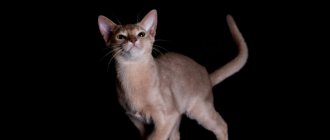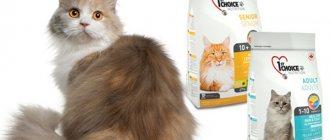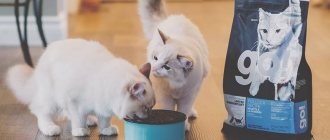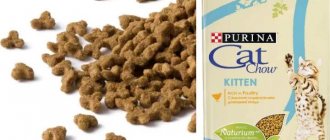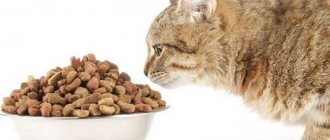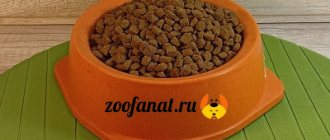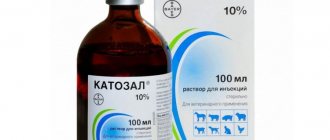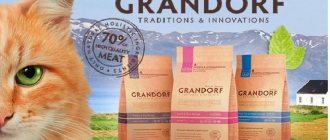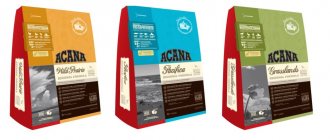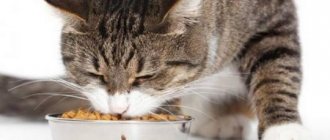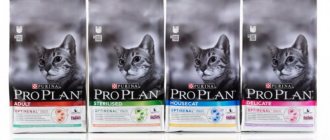Breed Features
To raise a healthy Abyssinian kitten, before choosing a diet for their pet, owners must study and know the characteristics of the breed. Abyssinians are a rather fastidious breed to care for and maintain.
Important! Unlike other cat breeds, Abyssinians are more prone than others to intestinal disorders and food (nutritional) allergies. Therefore, the choice of diet and nutrition must be approached with all responsibility.
Abyssinian cats are inquisitive, active, energetic, playful and very sociable. These are clean and tidy animals. They have a sharp mind, high intelligence, and a well-developed hunting instinct. They rarely act out of spite; they are not vindictive, but touchy.
Abyssinians are unobtrusive, but require attention, affection, and respect from their owners. If you treat your cat with all respect and give it warmth and care, your pet will be a loyal friend, companion and will gladly share your interests.
Since Abyssinian cats are not large breeds, they should be fed often, but in small portions. By the age of one year, the kitten must be accustomed to a certain diet and diet.
Choosing a place and dishes
For a comfortable stay, Abyssinian cats need to equip a house for sleeping and relaxing. It is placed in a secluded place, where the kitten spends the most time. You cannot place a cat house near household heating appliances or in drafts.
Important! The choice of place and dishes depends largely on age and character. Individual characteristics of your pet.
As for bowls, a cat should have 2-3 bowls. Two are for food. One may be deeper and wider, the second with several compartments. The main thing is that the kitten’s whiskers do not rest against the sides during the meal. For water, choose a deeper bowl so that your pet can drink comfortably.
You can buy special bowls for kittens. But remember that animals grow quickly, so you can give food to a small pet from bowls for adult cats.
Bowls can be:
- made of durable plastic;
- ceramics, clay;
- stainless steel
Important! Do not use aluminum containers for feeding cats or drinking water. Aluminum releases harmful chemicals, especially when exposed to high temperatures.
Set up a place where your pet will eat. This should not be a pass-through place. If there are other animals in the house, place bowls on the nightstand, windowsill, or other elevated surfaces. No one should disturb the kitten while eating.
Place the water bowl further away from the food bowls. Residues of food should not get into drinking water. This is unsafe for the pet's health.
Keep your cat's dishes clean and rinse them with clean running water after each feeding without using household chemicals.
Castration of cats and sterilization of cats.
Often castration gives rise to problems with urination and urolithiasis. Such animals should be carefully monitored in terms of nutrition.
After castration and sterilization of Abyssinian cats, food containing phosphorus and magnesium should be excluded, as well as fish should be excluded forever, this can cause the appearance of stones. Pay attention to the shelves with cat food; there is a large selection of food for castrated and sterilized pets. You should give preference to this particular food; it contains all the necessary substances for Abyssinian cats. The diet of Abyssinian cats must include fermented milk products, as well as cereals and vegetables. If castrati refuse dry food, replace it with large pieces of meat, this will help cleanse the cat's teeth and gums of unwanted bacteria. After all, the teeth of castrates are susceptible to dental diseases. Experts advise not to feed a cat that is in heat for at least one day to calm the cat down. After the estrus has stopped, the diet should be resumed.
What to feed an Abyssinian kitten
Feeding Abyssinian cats must be approached very responsibly. It is especially important to choose a diet for kittens of this breed. Nutrition should be complete, fully balanced, fortified and varied with a natural type of feeding.
You can feed Abyssinian kittens:
- natural fresh products specially prepared for your pet (natural diet);
- high quality ready-made industrial feeds (ready-made rations).
You can also choose a combined or mixed diet for Abyssinians. But remember that each diet has both its advantages and disadvantages. Therefore, when choosing a diet for your furry pet, take into account the speed of its development, activity, physiological, individual, breed characteristics, and health status.
Features of feeding Abyssinian cats
To ensure your cat’s health is strong, all organs work like clockwork, and various metabolic disorders do not arise, you need to wisely select foods to feed your pet. There are several basic rules that you should rely on when creating an animal menu:
- You should not mix feeding with industrial balanced feeds and homemade food;
- cats are predators, so meat should form the basis of the pet’s diet;
- To quickly obtain energy, carbohydrates are needed; they are found in rice and wheat;
- From dairy products, you can occasionally give cottage cheese or kefir; milk should not be given to cats.
Important! Sausage is not suitable for Abyssinians as food. Typically, various spices, preservatives, and thickeners are added to this product. This is very harmful to the health of the animal.
Poor diet can lead to indigestion and diarrhea. The owner will be entirely to blame for this, since he did not provide normal nutrition to his ward.
Natural diet
Natural food, according to many breeders and veterinarians, is the best option for feeding cats. But in the case of the Abyssinian breed, it is very important to achieve the maximum balanced natural diet. This breed is prone to allergies, intestinal disorders, and gastrointestinal diseases.
Benefits of a natural diet:
- the owner is confident in the quality and freshness of food;
- the pet receives a varied menu;
- natural food is somewhat cheaper than feeding with high-quality feed;
- You can choose the ideal diet for your pet, taking into account his taste preferences.
But with a natural type of food, you will have to spend time preparing food for the kitten. In addition, not all foods can be given to Abyssinians. So if you don't have time. It is best to choose a different diet for your pet.
What can be included in a natural diet for an Abyssinian kitten:
- Meat products. Cats are predators and the basis of their diet should be meat (at least 85-90%). Kittens can be given only lean varieties of meat and poultry (turkey, chicken, rabbit, calf, lamb) after preliminary heat treatment. The meat can be boiled or raw. It is cut into small portions. Kittens can also be given raw minced meat.
- Cereals, cereals. Porridges are well boiled in low-fat meat and fish broth. Cereals in an Abyssinian kitten's diet may include rice, buckwheat, oatmeal or wheat. Raw minced meat, finely chopped meat, raw, stewed vegetables, and herbs are added to the porridge. You can add kefir, fermented baked milk or sour cream.
- Dairy products. Fermented milk products must be present in the kittens' diet every other day. Low-fat kefir, fermented baked milk, calcined cottage cheese, yoghurts without dyes or fruit fillers. Milk starting from 4 months can cause distress due to a decrease in the enzyme that digests lactose. Therefore, low-fat whole milk is given to the pet if there is no diarrhea.
- Low-fat fish (sea, ocean). It is given to the kitten no more than twice a week in boiled, stewed, baked form. Before serving, the carcass is pitted. Offer your pet shrimp or other seafood as a treat twice a month.
- Offal. It is given only to older Abyssinian kittens, starting from six months. Months in raw, boiled form. You can give chicken hearts, stomachs, calf liver.
- Eggs. Once, maximum twice every 7-8 days, give the kitten one boiled yolk. It is best to have quail eggs in your diet. They can be given whole, raw or cooked.
- Vegetables fruits. They contain a large amount of plant fibers to normalize digestion, vitamins, minerals, and beneficial organic compounds. Vegetables (beets, zucchini, carrots, cauliflower) are boiled, stewed, baked or served raw. They are mixed with minced meat. Give fresh greens. For better digestibility, season the vegetable stew with a small amount of vegetable oil. From fruits, as a rule, kittens themselves choose what they like. But still, do not give your pet too sweet fruits (grapes).
To normalize metabolism and cleanse the stomach of hairballs, sow sprouts of oats, wheat or special grass for cats.
Don’t forget that in addition to greens and vegetables, natural food must in any case be supplemented with vitamin preparations, mineral supplements and complexes.
What you should never give to cats
Neither kittens of any age nor adult cats should be offered: - poultry bones: sharp fragments can cause perforation of the stomach and intestines; - any type of pork - such meat immediately increases cholesterol; - fatty foods: the only fat may be a limited amount of vegetable oil; - river fish that has bones and parasites that do not die when cooked; — confectionery products of any kind; - fresh white bread, especially rich bread; - flour dishes - pancakes, pies, pasta; — marinades, pickles of any kind; - fried smoked food, any sausages. It is unacceptable to offer leftover dishes from the hosts’ table or stale food, as well as very liquid soups in large quantities.
Ready diet
With a ready-made diet, Abyssinian kittens are fed wet, dry, semi-moist industrial food, canned food, and high-quality pates. The prepared diet should be varied. You should not feed your pet only, for example, dry food or wet food. Combine dry pads with canned food, pates, and treats for kittens.
Advantages of ready-made diets:
- no need to waste time preparing a varied menu for the cat;
- the brand line includes food for kittens of various age groups;
- dry food has a long shelf life;
- the manufacturer indicates the approximate daily allowance by age on the packaging;
- large selection of flavors.
The line of well-known brands also includes products for weakened animals, for kittens with a sensitive gastrointestinal tract, and pets prone to food allergies.
The best food for Abyssinian kittens:
- Royal Canin.
- Hill's.
- ORIGIN.
- Acana.
- Nutra Gold.
High-quality feed has a balanced composition and contains all the necessary nutrients, vitamins, microelements, and amino acids. Holistics are intended for nutrition of Abyssinian kittens with sensitive digestion. Contains probiotics and enriched with B vitamins.
Feeding mode
The decision of what to feed an Abyssinian kitten very much depends on what kind of diet you can provide it with. The younger the animal, the more frequent feeding it needs, because the kitten's stomach is too small to accommodate large amounts of food at once, and it needs to eat often, but little by little.
Only dry food can be left for the whole day, so that the Abyssinian can go to the bowl on his own when he feels hungry. In the case of canned food or a natural diet, you will have to independently give the kitten a portion of food: at the age of one to four months - five to six times a day, from four to five - four times, from six months switch to three meals a day, and by one year - for two meals a day.
It is extremely important to follow feeding standards. In the case of ready-made industrial diets, whose calorie content is precisely known, and the packaging contains clear recommendations, everything is simple. When it comes to natural nutrition, you will have to calculate the portion size yourself; this is very difficult to do and there are no more or less clear recommendations on this matter, since caloric content fluctuates greatly depending on the composition of the diet.
You will have to focus mainly on the kitten itself; usually babies are not prone to overeating, although as they grow, the situation may change and you need to carefully monitor that the pet does not overeat.
Sample menu by age
Feeding Abyssinian kittens implies a clear organization of nutrition in accordance with the age of the kitten. Therefore, we present an approximate menu by age. Little kittens feed strictly according to the clock. As they grow older, the frequency of feedings decreases, but the volume of portions increases. Until 9-11 months, the pet should eat according to a set schedule and receive the same diet.
Feeding schedule and frequency:
- From birth to two weeks of age, kittens eat 9-10 times a day without a break for night sleep. They need to be fed every two hours. The baby should drink about 3-4 ml of milk at a time.
- From 14 to 18 days - 8-9 times a day without a break for night sleep. Approximately 5-7 ml of milk formula, milk substitute, is given.
- From 19 to 30 days - seven to eight times a day and one night feeding. Feed 10 ml of mixture.
- From one month to two – 7 times a day.
- From 2 to 3 months, kittens need to be fed 6-7 times a day.
Up to a month
The main nutrition of kittens from birth to one month is colostrum and mother's milk. With it, babies receive nutrients and initial immunity (protective antibodies).
If for some reason the kittens are left without a mother cat or the lactating female does not have enough milk, the owners take care of the small pets. Ideally, try to find another nursing cat to care for and feed the newborn kittens.
If this is not possible, the following is used for artificial feeding:
- formulas for infants without sugar and additives (Nutrilon, Malyuk);
- industrial cat milk substitutes (Babycat Milk from Royal Canin,
- Katzenmilch, Hartz, Gimpet Cat-Milk).
You can also prepare mixture for artificial kittens yourself using specially developed recipes. For Abyssinians, a Scott or Tailing mix is ideal . Recipes can be found on thematic forums or websites.
Kittens are fed from a pipette, a syringe without a needle, or use bottles with a nipple. You can purchase special kits for feeding newborn animals at pet stores or veterinary pharmacies.
After eating, be sure to massage the kitten’s tummy at the base and wipe the genital area with a sterile cotton swab. This is necessary to normalize digestion and bowel movement.
Keep kittens warm. Mixtures should be fresh, at room temperature. Keep dishes clean and hygienic for small pets.
2 months
At 2 months, Abyssinian kittens can be given complementary foods, in addition to the milk they receive from the cat.
For complementary foods and artificial feeding, experts recommend using: Whole homemade milk with the addition of yolk, sugar or glucose. It is diluted half with water. It is best to use goat's milk for complementary feeding.
- Cat milk substitutes.
- Formulas for infants.
- Calcined cottage cheese, kefir.
- Low-fat meat broth.
- Meat mousses, pates, purees for kittens.
- Shredded raw meat that has been previously frozen. Before giving it to your kitten, defrost it and scald it with boiling water.
- Boiled minced meat, diluted in broth.
Make sure the kitten is well-fed, but do not overfeed. Correctly calculate single servings based on the rate of growth and development of the kitten. On average, a serving should be 60-80 grams.
3 months
At 3 months, kittens should receive their first vaccination and undergo preventive deworming. After vaccination, the pet's appetite may be slightly reduced, so the kitten may lose weight. If you have no health problems, don't worry. After vaccination, appetite returns to normal on the third or fourth day and the baby will again begin to gain weight, grow and develop.
From natural products, you can give an Abyssinian kitten:
- whole low-fat milk;
- dairy products;
- vegetable oil;
- boiled, stewed, grated vegetables;
- porridge (rice, buckwheat, oatmeal, a mix of 2-3 cereals), cooked in milk, water, low-fat meat broth;
- boiled sea and ocean fish without bones;
- raw, boiled quail eggs, chicken egg yolk.
Important! The average portion for kittens at this age is 130-200 g. Feeding frequency – 3-4 times a day.
4 – 6 months
At 4-6 months, kittens undergo active development, their behavior changes and they already have certain taste preferences. Keep your Abyssinian either on a prepared diet or on a natural diet.
Important! During this period, Abyssinians, like kittens of other breeds, change their milk teeth, strengthen their skeleton, and form a backbone, which requires energy expenditure from the body. Therefore, the diet should be fortified and nutritious.
You can feed your kitten with industrial ready-made food, high-quality canned food, formula milk, or natural products specially prepared for your pet.
When natural, the diet includes:
- fermented milk products (kefir, fermented baked milk, cottage cheese fortified with calcium, yogurt without additives);
- lean meats and poultry;
- oceanic, sea low-fat boiled fish without bones;
- quail, chicken eggs;
- raw, boiled, stewed vegetables, seasoned with vegetable oil.
From 5-6 months, by-products are introduced - chicken, veal liver, hearts, lungs, chicken stomachs. They are boiled for several minutes or scalded with boiling water. By-products are given once every 5-6 days.
From 6 months to 1 year
From 6 months to 1 year, the kitten finally develops taste preferences and preferences. When preparing a ready-made diet, combine drying with wet, semi-moist food, pates, and canned food. At the same time, feed your pet only one brand or brand of food.
A natural diet should include lean meat, poultry, offal, eggs, fruits, vegetables, herbs, dairy, fermented milk products, fish and meat broths.
Features of feeding Abyssinian kittens
Abyssinian kittens have no problems with food in the first one and a half, or even two months of life - mother's milk is enough. Feed very carefully, in very small portions. Soft food can be offered at one and a half months of age. The number of feedings per day depends on age: - 6 times a day for 120-150 grams - up to 3 months using a children's assortment of ready-made food or natural boiled, pureed products (taking into account baby teeth); - 5 times - after three to five months - medium-hard food is added after the appearance of the second strong teeth; - 4, and soon 3 meals after 5 to 8 months from the “junior” line, and with natural feeding - very finely chopped. - Starting from 8 months of age, young animals, like adults, are invited “to the table” in the morning and evening.
Vitamins and supplements
A kitten's growing body must receive all the vitamins and mineral supplements necessary for health and development. There are complexes on sale designed for kittens starting from 2-3 months of age. It is best to use complex preparations (Gamavit, Tetravit, Trivit). At the same time, we note that vitamin supplements are necessary when keeping a pet on a natural diet. High-quality industrial feeds have a completely balanced composition and already contain all useful substances.
From available means, the diet is enriched once a week with fish oil (one drop for each feeding), dry yeast, and meat and bone meal.
